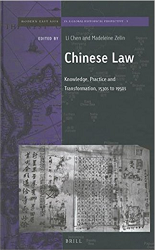A new book on late imperial and modern Chinese law and history, edited by Li Chen and Madeleine Zelin, and contributed by a dozen ISCLH members, has just been released. Here is the information about its contents and how to order it if you are interested.
The twelve case studies in Chinese Law: Knowledge, Practice and Transformation, 1530s to 1950s, edited by Li Chen and Madeleine Zelin, open a new window onto the historical foundation and transformation of Chinese law and legal culture in late imperial and modern China. Their interdisciplinary analyses provide valuable insights into the multiple roles of law and legal knowledge in structuring social relations, property rights, popular culture, imperial governance, and ideas of modernity; they also provide insight into the roles of law and legal knowledge in giving form to an emerging revolutionary ideology and to policies that continue to affect China to the present day.
The editors hope that this will be one of a new series of books focusing on Chinese law and history from the global community of ISCLH. Its contributors include Jennifer Altehenger, Daniel Asen, Li Chen, Bryna Goodman, Weiting Guo, Jianpeng Deng, Zhao Ma, Janet Theiss, Margaret Wan, Yu Wang, Yanhong Wu, Madeleine Zelin, Ting Zhang, and Taisu Zhang.
